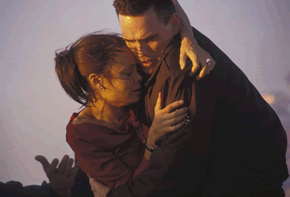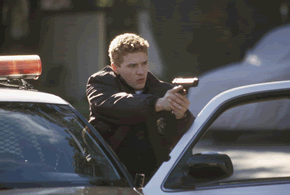Genre: Drama
Director: Paul Haggis
Starring: Sandra Bullock, Don Cheadle, Matt
Dillon, Jennifer Esposito, William Fichtner, Brendan Fraser,
Terrence Howard, Chris “Ludacris” Bridges, Thandie
Newton, Ryan Phillippe, Larenz Tate
RunTime: 1 hr 47 mins
Released By: Golden Village
Rating: M18
Opening
Day: 7 July 2005
Synopsis
:
A Brentwood housewife and her DA husband. A Persian store
owner. Two police detectives who are also lovers. A black
television director and his wife. A Mexican locksmith. Two
car-jackers. A rookie cop. A middle-aged Korean couple…
They all live in Los Angeles. And in the next 36 hours, they
will all collide…
Movie
Review:
Paul
Haggis mentioned in an interview that he “[liked] to
make people uncomfortable so that they think.” So he
did, and so they will. With his directorial debut, “Crash”,
there is little doubt that everyone who sees it will be intellectually
and emotionally challenged.
There
are at least 6 stories interweaved in “Crash”,
the ways in which they coincide slightly bizarre, largely
coincidental and pure editing hell. A black cop (Don Cheadle)
is having an affair with his Latina colleague (Jennifer Esposito)
while investigating a high-profile case, but neither knows
each other very well. A maligned Hispanic locksmith (Michael
Pena) is perceived to be a crook, but is in fact a hardworking
husband and doting father. A black TV director (Terrence Dashon
Howard) goes through a rite of passage of sorts and along
the way manages to somewhat awaken a delinquent (Ludacris).
His accomplice (Larenz Tate), who receives no such revelation,
is assumed to have received devastating payback, as will all
the characters at some point of the movie. Rest assured that
the highly complex script is swimmingly mastered by Haggis,
who also has writing credits.
The movie
brilliantly portrays flawed characters that are both heroes
and villains. No one is spared of ambiguity, not even the
angel-faced rookie played by Ryan Phillippe, or the hateful
Sergeant Ryan (Matt Dillon). Both go through similar albeit
unique situations that elevate them from stereotypes and while
the stunning ironies of their analogous stories may seem contrived,
why should that be faulted? If anything, I believe it to be
a case of art imitating life, since life is often self-mocking
and sometimes, cruelly tragic.
Truly
surprising twists and turns litter this masterpiece; there
is little way of knowing what’s going to happen next.
Exhilarating minor climaxes, such as the one evoked in the
movie’s official poster, are intercut with poignant
scenes, which in this case involves the revealing of the proverbial
angel who literally heals and seemingly performs miracles.
The angel here is in fact an Iranian-American doctor (Bahar
Soomekh), a filial daughter who, unbeknownst to her Persian
father (Shaun Toub), has saved him from a potential tragedy.
There is also a very affecting major climax involving Sgt.
Ryan and a black woman (Thandie Newton) he had shamed earlier,
but don’t hold your breath for a be-all and end-all
resolution. As mentioned, there is a great deal of ambiguity
in “Crash”, but that is precisely why the movie
is so effective and provoking.
What works
in “Crash” is its accessibility – it doesn’t
preach from a moral high ground. No one is completely right
or wrong and all are as guilty as they are victims. When a
sudden carjacking accident stuns the white wife of a district
attorney (Sandra Bullock and Brendan Fraser respectively)
into frantically crucifying the Hispanic locksmith, we are
emotionally engaged and able to empathize with her paranoia
but at the same time quietly reprove in our popcorn-covered
political correctness. The only ones on a moral high ground
are those in the audience who remove themselves from the stark
honesty of Haggis’s characters and fail to register
a link between what is being said by the characters and what
every single person, regardless of race or stature, is perfectly
capable (and perhaps even guilty) of saying.
What Haggis
has achieved here is overwhelming, perplexing truth served
on a silver platter and if that is deemed superficial, it
is only because reality is difficult to grasp, harder to admit
and all too easy to evade. With “Crash”, he has
verbalized thoughts we are afraid to think and presented extremities
we instinctively condemn, but to understand it as merely thus
is to overlook the film’s purpose. “Crash”
is not looking to be controversial, nor is it simply seeking
our support against racism. It is meant to make us reflect
on the bigotry that resides in ourselves (yes, you and I alike)
and to remind us that it is a dangerous emotion that will
threaten to break its silence, even in the most pristine folk,
when confronted with tension. The movie ends on a somber note
but it is not entirely cheerless, for hopefully everyone is
a little more sober than they were before it.
Movie
Rating:     
Review
by Angeline Chui
Talk
about "Crash" in our forum
|





